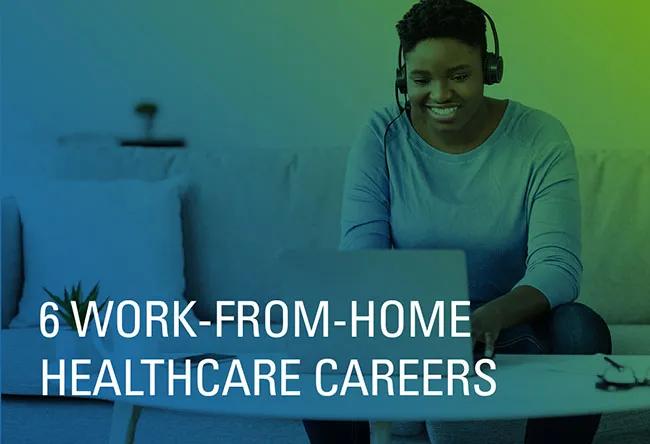Remote Healthcare Career Options: Potential Virtual Work Opportunities in Healthcare

If you want a job you can do from home, you’re not alone. A survey of more than 8,000 working professionals found that 51% wanted a fully remote job, with 63% wanting this so badly they would even take a pay cut to get it.1
While many healthcare roles require that you work in a clinical or office setting — such as dental assistant and phlebotomy technician — virtual work opportunities do exist. Pursuing one of these remote positions offers several benefits.
Benefits of Work-from-Home Healthcare Jobs
Advantages of a remote healthcare job include:
- Greater flexibility. Some people working remotely can choose their hours. As long as they work the total number of hours required, for example, the employer may not care if they perform their jobs from 7 a.m. to 3 p.m. or 9 a.m. to 5 p.m. This type of setup can provide workers with greater flexibility for handling other commitments, such as picking kids up from school or attending a doctor’s appointment with an ill parent.
- Better work-life balance. The average commute time for people not working remotely is over 25 minutes each way.2 That’s roughly 51 minutes every workday that you lose in travel time. When you have a work-from-home healthcare job, you get this time back. Imagine what you could do with almost an extra open hour each day. You could use this time to engage in your favorite hobby or spend quality time with your kids, giving you a better work-life balance.
- Reduced expenses. If you don’t have to get to and from work, your travel expenses are lower. And if you don’t need work clothes for every day of the week (maybe just when you need to appear for video meetings or calls), you may be able to reduce your clothing expenses, too. Lowering work-related costs such as these can make it possible to keep more cash in your budget.
- Increased job opportunities. Pursuing a virtual healthcare job also enables you to apply for positions you may not otherwise have access to geographically. This can be especially beneficial for people who live in remote or rural areas, where healthcare jobs may be sparse or hard to come by. Remote work removes this barrier, potentially opening you up to more job opportunities.
6 Remote Healthcare Job Options
If a virtual healthcare job sounds like it may be a good fit for you, there are a few roles that may offer this option (depending on the employer). Here are a few to consider.
#1: Medical Billing and Coding Specialist
A medical biller and coder transforms patient health data (diagnoses, treatments, etc.) into universal codes. These codes are used to communicate with health insurance companies or other third-party payers so they know how much to reimburse the healthcare provider. Medical billers and coders may also track payments, correct rejected claims, and follow up with patients who have an outstanding balance.
Working in this role requires that you have some level of proficiency with computers and an eye for detail. You’ll work with several different coding systems, also requiring that you understand how to find the code that accurately reflects the patient information.
#2: Medical Office and Billing Specialist
You may also have the opportunity to work remotely as a medical office and billing specialist. This role includes a combination of administrative and billing functions. Tasks you may be assigned to perform include preparing documents, updating patient records, submitting insurance claims, and handling payment issues.
Working in this healthcare role involves helping healthcare facilities run smoothly. You’re involved in a variety of tasks, which can keep you from getting bored. You also get the opportunity to work with both people and computers, if this suits your interests.
#3: Health Information Technician
Health information technicians spend their days working with patient health records. They’re tasked with making sure these records are complete and accurate. They’re also responsible for ensuring that the health records are accessible to those that need access but are not accessible by unauthorized persons.
Health information management can be a good career track for people with a keen eye for detail and often notice when inaccuracies exist. If you’re analytical, you might enjoy this healthcare role, too — particularly when analyzing records to make sure they’re complete and secure.
>#4: Bookkeeper or Accounting Clerk
Some healthcare organizations hire remote bookkeepers or accounting clerks. Individuals in these entry-level roles create financial documents that company leaders can use to determine the organization’s financial status, compare monies coming in versus monies going out, understand the level of outstanding reimbursements, and more. Leaders can use this information to set organizational goals or comply with an IRS audit.
Becoming a bookkeeper or accounting clerk may be desirable if you like working with numbers and enjoy the idea of working with financial data. Individuals in these roles also benefit from attention to detail as accuracy is important when creating financial documents and reports.
#5: Medical Assistant
The Bureau of Labor Statistics reports that most medical assistants work in doctors’ offices.3 That said, certain healthcare organizations offer virtual medical assistant jobs.4 In these roles, the medical assistant may be tasked with acting as a liaison between patients and the healthcare facility, such as by answering patient questions, navigating them to helpful resources, and documenting their electronic health record (EHR) with updated information.
A virtual medical assistant job may be a good fit for people interested in a healthcare role that works directly with patients. While you may not be able to perform typical in-person medical assistant functions — such as taking vital signs or drawing blood — you can still play an important role in the healthcare process, especially for patients who need care but may not have transportation to and from their doctor’s office.
#6: Call Center Representative
Call center representatives handle incoming phone calls for healthcare organizations. Depending on the reason for the call, this may involve scheduling an appointment, communicating information about office procedures, or referring the caller to someone else in the organization who can resolve their concerns or issues.
Essentially, you’re a customer service representative for the healthcare organization. So, this position requires that you understand basic healthcare and medical terminology. Good communication is important as well, and being a people person helps, too!
Skills Helpful When Performing Virtual Healthcare Work
Certain skills can contribute to your success when working in a virtual healthcare job. They include:
- Effective communication skills to help you accurately exchange information with team members, members of other organizations you might interact with, and when speaking with patients.
- Proficiency with technology, enabling you to do your work from home with greater ease, requiring minimal help when performing your job functions.
- Knowledge of healthcare and medical terminology, so you can better “speak the healthcare language” when talking with co-workers, outside organizations, and patients.
- Knowledge of healthcare regulations and laws to ensure that you understand how to perform your job duties ethically and legally.
While many healthcare positions involve going into an office or clinical setting (in addition to ones that involve providing care within patients’ homes), remote healthcare jobs do exist through some employers. That makes this a potential option for individuals who like the idea of working from home but also have a passion for healthcare.
How Can UMA Help?
If you complete your training at Ultimate Medical Academy, you gain access to our Career Services team. This team can assist you with your job search, including resume assistance, interview guidance, and other activities that can be helpful when pursuing opportunities within the healthcare field — whether in person or remote.
This team also works with UMA grads to staff healthcare positions with our trusted employer partners. While many of the entry-level healthcare roles we prepare our students to pursue are not virtual roles, sometimes all you need is the right connection, and we’re happy to pursue potential connections for graduates of our healthcare training programs.
This blog does not necessarily reflect UMA graduate outcomes. Students graduating from UMA, or another healthcare education program, may or may not find remote positions in their field of study.
1 FlexJobs. Losing Talent to Return-to-Office Mandates. https://www.flexjobs.com/blog/post/losing-talent-to-return-to-office-mandates-insights-from-the-flexjobs-survey/
2 U.S. Census Bureau. Commuting in the United States: 2022. https://www2.census.gov/library/publications/2024/demo/acsbr-018.pdf
3 Bureau of Labor Statistics. Occupational Outlook Handbook. Medical Assistants. https://www.bls.gov/ooh/healthcare/medical-assistants.htm#tab-3
4 Rokicki-Parashar J, et al. Transforming interprofessional roles during virtual healthcare. J Prim Care Comm Health. https://journals.sagepub.com/doi/full/10.1177/21501327211004285
Request Information
Talk with us. Start your journey.
Complete this form and we'll call you to explore options at UMA and answer your questions. We'll also email you info on how to get started. We're with you at every step!
Request Information
Talk with us. Start your journey.
Complete this form and we'll call you to explore options at UMA and answer your questions. We'll also email you info on how to get started. We're with you at every step!
About the Author
 Christina DeBusk
Christina DeBuskChristina DeBusk is a freelance writer who has been providing health and wellness content to healthcare organizations such as the American Chiropractic Association and International Sports Sciences Association (ISSA) since 2011. She obtained her Bachelor of Science in Sociology from Central Michigan University, minoring in psychology. She has also earned several ISSA certifications, including Certified Personal Trainer and Certified Nutrition Specialist, achieving the status of Elite Trainer.
Related Content

Pursuing Healthcare Career Training as a Medical Administrative Assistant
Read More
